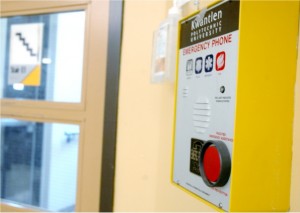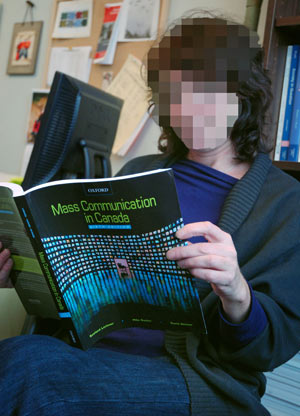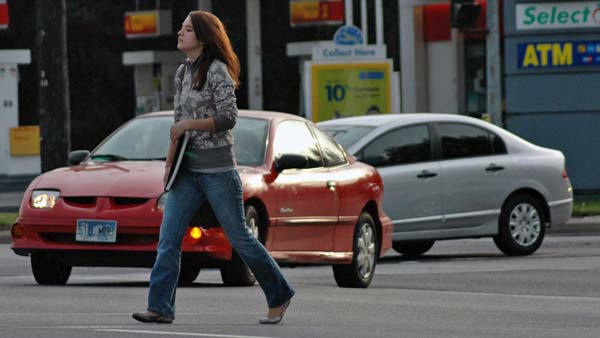Security officers on campus put students at ease
September 27, 2010 by Sarah Casimong · Leave a Comment

In case of emergency, speaker phones are located on the Surrey, Richmond and Langley campuses. The two-way speaker phone is answered by security personnel and faculties. (Photo by Sarah Casimong)
Most students, occupied by the stress of classes, barely have time to think about the safety of their environment at the school. It might take a rare incident before students look into what is provided for them by faculties and what they should do if a threat should occur.
Of those asked whether they feel safe at Kwantlen, most students said yes. Many acknowledged the presence of security officers as the main reason for their ease.
According to the school website, there are security officers on all four campuses. With the exception of Cloverdale, all campuses have emergency speaker phones students can use to call security personnel.
Jayson Bulahan, 19, who is studying criminology at the Surrey and Richmond campuses, has been attending Kwantlen for two years and feels free from harm.
“I’m aware that there are security guards [around] the campus area,” said Bulahan. “So far, there hasn’t been any issues within campus that has ever made me feel unsafe.”
Chiny Babilonia, 21, taking criminology, had similiar views. “I do feel somewhat safe at night,” said Babilonia. “I used to take night classes at the Surrey campus and after class I don’t feel any danger or harm. Whenever I would walk in the parking lot to go to my car, [knowing that there are] security guards walking around campus when it’s near closing time, [helps me feel] safe.”
Some students credited the school’s size as a safety factor.
“I feel at ease at school, whether it be night or day,” said Michael Viloria, 20, taking history at both Surrey and Richmond. “I think the school is easy-going, although, the threats may come from the outside. Even so, the school isn’t as big as other universities, so finding help in the security office doesn’t require much effort.”
However, not all students feel safe. Michelle Mariano, 27, a psychiatric nursing student, is afraid to walk alone at night.
“I don’t see any security around,” said Mariano. “Last semester I had a late class. It’s scary if I have to walk by myself.”
For more information on security, visit the security section of the school site.
Online anonymity results in less privacy
January 12, 2010 by Sarah Jackson · Leave a Comment

Annette Reynolds, sociology instructor at Kwantlen Polytechnic University, refused to allow her face to be published in a statement against the invasion of privacy introduced by internet technologies.
The explosion of personal information on the Internet is leading to “Facebook creeping,†new reasons for being fired, and, according to a Kwantlen sociology instructor, public humiliation.
“[Young people are] more inclined to invade other people’s privacy without feeling invasive about it,†said Annette Reynolds.
“There’s a tendency to feel like you can cross social barriers because there’s an anonymity. That’s a kind of cyber-bullying,†Reynolds said, remembering a time when she read hurtful comments on the teacher-rating web site RateMyProfessors. com.
Cyber-bullying is a rising trend, according to a Microsoft Canada Youthography Internet Safety survey released in February. The survey of people from nine to 17 years old found that 40 per cent of Canadian youth had been bullied online, up from 25 per cent in 2004. It also reported that 60 per cent of youth believe people bully because it is “cool.†More than half of the 16 per cent who said they have cyber-bullied another youth said there were no consequences to their bullying.
“Public humiliation is a form of entertainment,†said Reynolds.
Bullying is one of the side effects of an information free-for-all that includes blogs about people’s personal lives, YouTube videos featuring friends, and Facebook pages full of personal info. Privacy has a different meaning than it used to.
“I don’t think it’s fair to say kids today don’t care about their privacy,†said Micheal Vonn, B.C. Civil Liberties Association policy director. “Previous generations never had to think about this stuff because the system was so different.â€
In the past, privacy was provided by default before technological advances introduced a plethora of information databases. Now that personal information is required in order to access many Internet services, people must choose between those services and privacy. “What we really want is control,†said Vonn.
The government hasn’t hesitated to take advantage of the new opportunities for control, either. Technology-based surveillance, called dataveillance, is increasing as a form of policing and is a worrisome opportunity for state control, she said.
“The new policing philosophy is, ‘Why don’t we just know a whole lot about everybody all the time. Then we’ll be able to do a risk assessment.’â€
Knowing a lot about everybody all the time applies to personal relationships, too. A University of Guelph study released in August indicated that the more time a person spends on Facebook, the more likely they are to become jealous of their significant other because of overexposure to triggers. A person may become alarmed by a comment from someone saying “It was great to see you,†become jealous, and begin “Facebook creeping†that commentator’s profile for more information.
This trend in “Facebook creeping†leads to suspicions, just as government dataveillance does.
“[Data] starts to take on a reality and a life of its own… regardless of if you’ve done anything wrong,†said Vonn.
Employers are pursuing control too, said Michael Cox, who believes he was fired from a probationary bus-driver position with Coast Mountain Bus Company in January because of his blog.
“The company was sensitive to any kind of criticism and certainly sensitive to internal criticism,†Cox said. His blog included information about transit troubles during last winter’s snowstorms. “I think part of it was they wanted to make an example of me.â€
He advised bloggers and social media users to speak their minds but remember that their words could affect them professionally. “There is no such thing as true freedom of the press or true freedom of expression. There’s always going to be a limit.â€
The costs of censoring personal information that is being published online, such as reduced freedom of speech, need to be weighed against the benefits, which include retaining a job. In today’s digital age, the ability to avoid having personal details on the Internet isn’t always there. “The only way to remain a truly private individual would be to only purchase using cash and to be an electronic hermit,†said Cox.
It’s difficult to remain an electronic hermit, and one result is identity theft. Equifax Canada fraud specialist Vanessas Guillani told the Globe and Mail in June that identity theft went up 500 per cent from 1998 to 2003.
Identity theft is a big problem, but personal problems with identity itself are also on the rise. People can take on various identities through social media, which can result in a loss of self, according to Vonn. Internet game Second Life, which mimics real-world activities, including earning income and building relationships, has been featured in the news as a harbinger of real-life problems. A number of game users have adopted their character and attempted to create a perfect life, only to lose their jobs, friends and family. Some have fallen in love with virtual characters only to learn that the real person was not what they expected.
Sidebar: How to protect yourself
• Read privacy contracts, particularly those regarding health, credit-card and banking information.
• Ask questions or refuse to sign things that don’t seem worth it.
• Consider the implications of your pictures, thoughts and videos before you post them.
• Know your employer’s policies concerning social media.
• Remember that once you publish something online, you can never get it back.
Richmond crosswalk scares students
October 3, 2008 by Amy Reid · 2 Comments

A pedestrian light and a left-turn signal that come on at the same time has some students, including Nicky Forshaw, worried about safety at an intersection near the Richmond Kwantlen campus. (Amy Reid photo)
Richmond Kwantlen students who have had, or seen, close encounters with cars are unhappy with a crosswalk at the intersection of Garden City Road and Lansdowne Road, but the city’s traffic department has received few complaints or suggestions from residents.
At the intersection, which is half-a-block from Kwantlen, the pedestrian walk light and the left-turn light for traffic turning north onto Garden City Road, come on at the same. Two lanes of left-turning traffic approach pedestrians as they cross.
Students must cross the busy intersection to get to a bus stop. Frequently-used buses that stop there include the 301-Newton Exchance – which connects the Richmond campus to the Surrey campus – and the 407 Bridgeport bus.
Alexa Kulak, a first-year student at Kwantlen in general studies, considers this a dangerous crosswalk because the two lights come on at the same time.
“Another thing that adds to this problem is the speed limit on Garden City road,” she said. “It’s 60. People seem to think they can just drive at highway speeds and not look out for pedestrians.”
Many people are speeding through the intersection and have to slam on their brakes to avoid hitting pedestrians, she said. She uses this crosswalk when she gets off the 407 bus, and recalled a time when her mother nearly hit a pedestrian there.
Another student nearly was hit recently.
“A lady almost ran over me, she was in such a hurry. She stopped right in front of me and nearly hit me!” recalled a wide-eyed Kanwal Rashid, a science major at Kwantlen. She said there isn’t enough time for pedestrians to walk across and she finds it scary.
Amanda Punshon, a full-time student at Kwantlen taking general studies, said the crosswalk makes her uncomfortable, and she rides the 301 bus five days a week. “People don’t always stop for you. You have to kind of duck and dodge. It’s not fun.”
Nicky Forshaw, a student in the IDDS program at Kwantlen, takes the 301 bus every day during the week. She thinks that anything would be better than the current set up, suggesting a delay in the walk light.
The city is considering changing phasing so the pedestrian light doesn’t conflict with the left-turning signal. However, this could delay traffic and must be looked at carefully, said Victor Wei, the director of transportation for Richmond.
A remedy also being considered is increasing the size of the yield-to-pedestrian sign, which the city can do quite easily, Wei added.
Wei recognizes that the intersection is “challenging because you are having to walk straight into oncoming traffic.” But he says the city does not consider this a dangerous intersection.
The city does not receive many complaints regarding this intersection, but they are, “open-minded,” said Wei.
“If any of the users of this crosswalk, including the students from Kwantlen have any ideas of how to improve it, we are more than happy to hear them and consider them.”
He encourages students to contact Richmond’s traffic operation department with concerns and suggestions.


